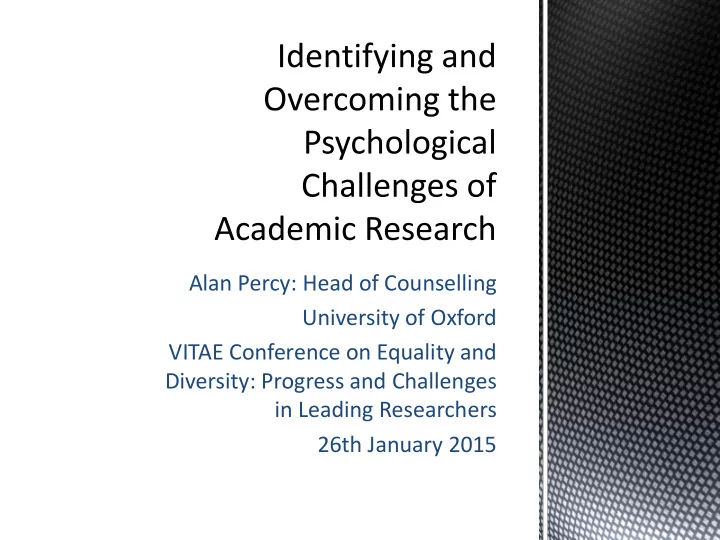

Alan Percy: Head of Counselling University of Oxford VITAE Conference on Equality and Diversity: Progress and Challenges in Leading Researchers 26th January 2015
Increased concern about mental health in the HE sector from media and campaign groups Greater awareness of mental health and fitness Increase in numbers of students and staff seeking help
57% of full time UK students completed their PhD after five years. 71% completed after 7 years (HEFCE 2005). 40%-60% in USA (results vary widely) After 7 years 53% students in Australia completed.
studies worldwide show science students have higher and speedier rates of doctoral completion than those students in social sciences and arts / humanities subjects UK HEFCE study(2005) showed 81% science students complete after 7yrs, compared with 61% social science and 62% humanities students.
Structure Stability of Funding Context / Place of work Team work versus lone working Relationship with supervisor Relationship with fellow students / post docs Sense of community versus sense of isolation
conditions of isolation, lack of external structures and realistic work targets can increase rumination, seriously impact on individual qualities and psychological factors which can have a negative impact on work efficiency. This can create or exacerbate mental health problems.
Over-committing : study, family, friends, teaching….. still take on more? Procrastination : Functioning or Non-Functioning? Perfectionism : unrealistic and impossible expectations. Aiming for perfection is not the same as aiming for excellence. Busyness : look and feel very busy, but is it what really needs to be done? Do you prioritise? Disorganisation : No routine or system to help manage your work, time, making life easier.
Be aware : review your thoughts and behaviours to identify unhelpful patterns, such as being perfectionist or over-committing. Challenge your thinking : Thinking determines our behaviour, so challenge your assumptions, beliefs and thoughts that aren’t working. Take Action : set achievable deadlines (procrastination), realistic goals (perfectionist) get rid of extra demands (over- committing)
Imposter Syndrome Capacity to tolerate uncertainty and ‘not knowing’ Capacity to tolerate things going wrong
Confidence/Self-efficacy Having a strong sense of self- worth, being self-reliant and having confidence in your ability to solve problems Knowing what your strengths and weaknesses are and that you can rely on your strengths to cope when things get difficult Adaptability People who can deal with ambiguity, think flexibly, recognize thinking errors and ‘reframe’ unhelpful, negative or inaccurate thoughts are more resilient. As are those who face challenge reflectively rather than reactively
Purposefulness Research shows that having a sense of meaning and purpose in what we do, having healthy expectations and motivation provides us with a foundation that allows us to be more resilient in the face of stress and adversity and a sense of hopefulness. It Is associated with higher levels of happiness and satisfaction and lower rates of depressive symptoms.
Social support People with high emotional awareness who understand their own emotions tend also to be high on empathy - the ability to read and understand the emotions of others This is important for resilience as it helps us to build relationships with others - creating social support High levels of social support are associated with good health and foster adaptive coping strategies. Practise asking for help and be receptive when it is offered Maintain high-quality relationships by telling people how much you value their support Return favors and thoughtfulness — the principle of reciprocity
Perspective All or nothing thinking Undermining satisfaction and self esteem Management of work / life balance Self Agency Need to take some degree of control Perspective of time
Individual Self Help Resources Peer Support Counselling Services Disability Support Structural / Institutional Creating Healthy Structure / Patterns of work Accountability and Feedback Information and Education
Recommend
More recommend